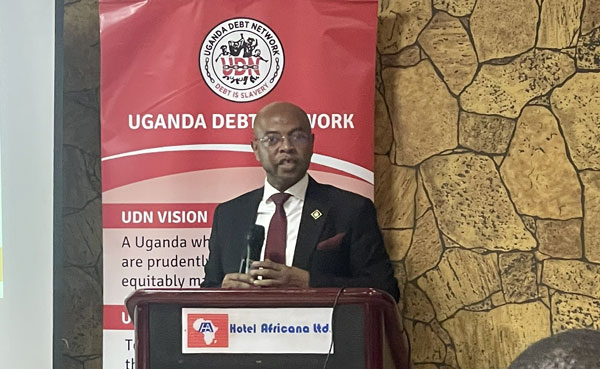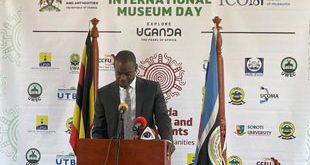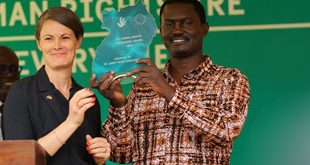
Kampala, Uganda | THE INDEPENDENT | The government of Uganda and individuals at family levels have been cautioned against borrowing for the sake of impressing others.
The cautionary call has been sounded by seasoned Makerere University Professor of Economics, Augustus Nuwagaba amidst concern about the increasing public debate.
“It is not necessary to steal or borrow to impress,” cautioned Nuwagaba. “I don’t know whom you are impressing especially the Africans. On those expensive weddings, I don’t know whom you are impressing. Uganda, Kenya, and Nigeria have also started. You continue with this artificial behavior and we shall meet.”
According to Professor Nuwagaba, some of the loans that the government has taken over the years were unnecessary.
He is of the view that if a loan was taken to put up infrastructure meant to simply impress a section of the public, then it was unnecessary.
Nuwagaba, the managing consultant of REEV consults international says while some Ugandans have cried out against the growing public debt, many individuals also still borrow to throw out glitzy weddings and parties.
In simple terms, Nuwagaba suggests that individuals and the Government should live within their means and avoid being ostentatious. He says whenever one takes a loan, he/she must know that it must be repaid.
Nuwagaba was delivering a keynote address at the third African Conference on Debt and Development (AfCoDD III).
The conference organized by Uganda Debt Network and African Forum on Debt and Development comes amidst concerns about the growing domestic and public debt. Latest projections.
According to reports by the Ministry of Finance, Uganda’s public debt stock increased from $19.54 billion (UGX 69,512.5 billion) in FY2020/21 to $20.99 billion (UGX 78,833.4 billion) in FY2021/22. While external public debt increased from $ 12.39 billion (UGX 44,061.4 billion) to $12.82 billion (UGX 48,171.8 billion) between June 2021 and June 2022, while domestic public debt increased from $7.16 billion (UGX 25,451.1 billion) to $8.16 billion (UGX 30,661.6 billion) over the same period.
The share of GDP, public debt increased to 48.4 percent in June 2022 from 47.0 in June 2021. The stock of public debt amounted to 39.5 percent of GDP up from 37.5 percent the previous financial year. The danger of the increasing public and domestic debt according to Nuwagaba and other experts is that it is denying Ugandans money that should have been invested in key sectors like education and health and generally the implementation of the National Development Plan (NDPIII).
Thirty percent of the national budget is being used to service loans acquired at very high-interest rates.
The debate about debt in Uganda comes just a day after UN Secretary-General António Guterres warned of soaring global public debt. He said a record $92 Trillion in 2022 3.3 billion people now live in countries where debt interest payments are greater than expenditure on health or education.
According to Guterres on average, African countries pay four times more for borrowing than the United States and eight times more than the wealthiest European economies.
A total of 52 countries – almost 40 percent of the developing world – are in serious debt trouble. Half of all developing nations Uganda inclusive include Uganda spend a minimum of 7.4% of their export revenues on servicing external public debt.
According to Professor Nuwagaba and other experts, the increasing reliance on private creditors, who offer more expensive debt and shorter maturities than official sources, has also complicated debt restructuring for developing countries.
In the case of Uganda, domestic borrowing from commercial banks is further complication of domestic debt, while external borrowing to construct projects like Bujagali power dam has also caused its headaches.
The construction of the Bujagali power plant for instance is estimated to have cost more than $862 million. US$191 million of that money was equity with the government contributing $20 million, while the rest was borrowed. But the project which was initially estimated to cost $ 460 million ended up costing Ugandan close to$862 million.
Professor Nuwagaba is of the view that the money for the construction of the Bujagali power dam could have been generated from the contribution by Ugandans other than borrowing at high-interest rates.
He cited the example of Ethiopia’s Grand Renaissance constructed at $4.8 billion using contributions by Ethiopians in the diaspora and those living within the country.
Ethiopians abroad and at home contributed the first $350 million, with government workers contributing amounts equivalent to a month of their salaries. It will generate about 6000 megawatts of electricity while Bujagali generates about 250 megawatts.
Otuke Member of Parliament, Paul Omara agrees with Professor Nuwagaba that because of the terms and conditions, Uganda would rather go for concessional loans and also float some shares so that citizens can contribute local capital for some of the projects.
Omara, one of the MPS that investigated the Bujagali and Umeme power deals said money was borrowed for the two projects at what he described as very unfavorable terms.
“I can tell you that the agreements, the contracts we signed, the terms and conditions of the loans were bad for us. That is why our electricity is very expensive” said Omara who also sits on Parliament’s budget committee.
The former banking executive says taking the loans apart, the other danger in terms of Uganda’s debt crisis is the rate of loan absorption.
Former Buliisa MP, Stephen Birahwa Mukitale said Uganda is increasingly in debt because it is debt servicing.
“We are spending more than we have. What can we do to reduce structural expenditures? Because all the development budget is from loans. I think it’s a very big problem to the country”
He is among some of the political leaders and economists who think Uganda may be in the same crisis it faced in the nineties in terms of the debt crisis.
“So when we are talking about Covid and the Russian crisis, they exasperated the debt problem we had much earlier. I indeed agree with alternative sources of funding. Why do we think that must come from the west of north?”
Uganda was the first country to receive debt relief worth US$650 million in the 1990s under the Highly Indebted Poor Countries (HIPCs) initiative.
THe country again got relief in 2006 under the Multilateral Debt Relief Initiative (MDRI), it got 100% debt forgiveness or cancellation which reduced the stock of the country’s debt to $1.6 billion.
******
URN
 The Independent Uganda: You get the Truth we Pay the Price
The Independent Uganda: You get the Truth we Pay the Price



I think as Ugandans, we are not very serious. It is true a section of our society is far committed in impressing others. i see it in the way we shop, happen in hang outs etc. Someone buys drinks and fills the table to impress. This behavior of our dear government officials, of borrowing without rest has corruption undertones. The President should start censoring this cartel of technocrats who call themselves financial advisors. I think some of them are agents of an overseas cartel of loan sharks in those big brother money organizations (IMF and World Bank).
This very group, i think is given ”tithe” after they have secured business for these neocolonialists. It is a shame for us as Africans that some of our brothers who we entrust with our well-being do not feel sorry for us. At the end of over borrowing and unnecessary borrowing, we pay for every debt we get extradited to by these so called ”technocrats”. It is a shame…look at rise in the public debt burden!!